#Bahamas, September 20, 2017 – Nassau – Fresh water is a “limited” and “critically” important resource to The Bahamas, however, its sustainability is threatened by climate conditions and changes, combined with the added pressure of an increasing population said the Education Minister, the Hon. Jeffrey Lloyd.
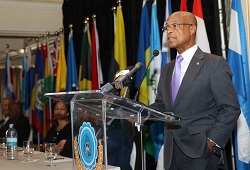 Minister Lloyd presented the keynote address at the official opening of the 12th United Nations Educational, Scientific and Cultural Organization (UNESCO) International Hydrological Programme (IHP) and Meeting of National Committees and Focal Points, September 18, 2017 at the British Colonial Hilton.
Minister Lloyd presented the keynote address at the official opening of the 12th United Nations Educational, Scientific and Cultural Organization (UNESCO) International Hydrological Programme (IHP) and Meeting of National Committees and Focal Points, September 18, 2017 at the British Colonial Hilton.
“Since the quantified freshwater resources of The Bahamas are best described as ‘limited,’ the provision of water supply is heavily sustained by means of seawater reverse osmosis (SWRO). SWRO is unfortunately a heavily energy-dependent means for the provision of fresh water.
Being the single source of natural fresh water for The Bahamas, the fresh groundwater resources have been identified for consideration as a strategic national resource,” he said.
The Meeting aims to agree on resolutions for implantation of the International Hydrological Programme in Latin America and the Caribbean (LAC) in the framework of the Sustainable Development Goals, and to discuss ways to achieve water security for Small Island Developing States.
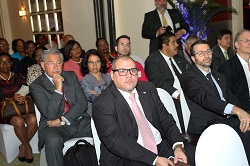 Over 60 international delegates representing the Caribbean, South and Central America – inclusive of observers of the Centers, under the auspices of UNESCO, UNESCO representatives on water, other partners, and prominent scientists — are in The Bahamas for the meeting.
Over 60 international delegates representing the Caribbean, South and Central America – inclusive of observers of the Centers, under the auspices of UNESCO, UNESCO representatives on water, other partners, and prominent scientists — are in The Bahamas for the meeting.
Among those in attendance were: the Hon. Romauld Ferreira, Minister of the Environment and Housing; the Hon. Frankie Campbell, Minister of Transport and Local Government and senior Government officials. E. P. Roberts Primary School Choir and the Government High School Band provided entertainment for the event.
Years 2015 thru 2017 — activities within the framework of IHP at the National Level for The Bahamas are:
-UNESCO Groundwater Resources under the Pressures of Humanity and Climate Change (GRAPHIC): North Andros Water Resource Area (a proposed UNESCO-IHP Project Site)
-UNESCO Ecohydrology: Lake Victoria, Exuma (a proposed UNESCO-IHP Project Site)
Minister Lloyd remarked that the GRAPHIC project is identified as being very “relative” to The Bahamas and that it can serve towards promoting and advancing sustainable groundwater management in The Bahamas and the Caribbean.
“In The Bahamas, we are an archipelagic state challenged with water resources, climate variation effects and effective renewable energy options. Sustainable use of all our natural resources must be a key consideration built within all of our development plans.”
Minister Lloyd said it is proposed that the UNESCO GRAPHIC program assists in the assessment and monitoring of the dynamic conditions of the Andros Island freshwater lens.
The long term goals of the effort would be to understand the dynamic geometry of the lens, identify areas of greatest sustainability for both resource protection and freshwater development, and to forecast the impacts of changing climate conditions, sea-level rise, and storm surge on the freshwater lens stability and longevity.
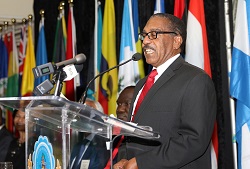 In welcome remarks, Chairman, Bahamas NATCOM, Desmond Edwards, said The Bahamas is an archipelagic state challenged with water resources, climate variation effects, and effective renewable energy options. Sustainable use of all our natural resources must be a key consideration built within all or our development plans.
In welcome remarks, Chairman, Bahamas NATCOM, Desmond Edwards, said The Bahamas is an archipelagic state challenged with water resources, climate variation effects, and effective renewable energy options. Sustainable use of all our natural resources must be a key consideration built within all or our development plans.
He stated that the recent impact of Hurricane Irma on The Bahamas brings into focus the question of restoring and maintaining potable water for residents of the southern islands.
“It is, therefore, timely that your deliberations on hydrological matters will include strategies of achieving water security which are now more than ever of immediate concern to our nation. This is an urgent consideration of The Bahamas Government as it embarks upon the tasks to rebuild and or restore damaged infrastructure on our family of islands.”
UNESCO’s IHP was founded in 1975 and implemented in 6-year programmatic time intervals. It is now in its eighth phase to be implemented during the period 2014-2021.
Important achievements in water and ecosystem management have been addressed in LAC. In the future, UNESCO-IHP plans to address Natural Risks & Disasters in LAC.
The UNESCO-IHP Phase #8 Strategic Plan Theme Areas are:
-Water-related Disasters and Hydrological Change
-Groundwater in a Changing Environment
-Address Water Security and Quality
-Water and Human Settlements of the Future
-Ecohydrology, Engineering Harmony for a Sustainable World
-Water Education, Key for Water Security
By: Kathryn Campbell (BIS)
Press Release: BIS
PHOTO CAPTIONS
Header photo: The Hon. Jeffrey Lloyd, the Minister of Education, is shown in the front row with delegates and Cabinet colleagues (4th from left) including the Environment and Housing Minister, the Hon. Romauld Ferreira (3rd from left); the Hon. Frankie Campbell, Minister of Transport and Local Government (5th from left); and Chairperson of Bahamas NATCOM and Desmond Edwards (7th from left). Also pictured are John Bowleg, IHP (Bahamas) Focal Point and delegates attending the meeting.
Insert 1: The Hon. Jeffrey Lloyd, Minister of Education presents the keynote address.
Insert 2: Delegates.
Insert 3: Chairperson of Bahamas NATCOM, Desmond Edwards gives the official welcome.
BIS Photos/Patrick Hanna
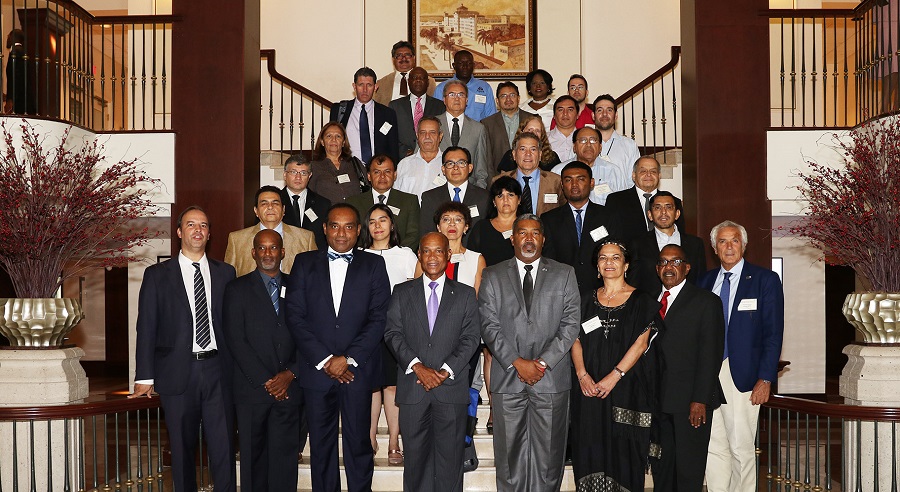

 News1 week ago
News1 week ago
 Caribbean News1 week ago
Caribbean News1 week ago
 News1 week ago
News1 week ago
 News6 days ago
News6 days ago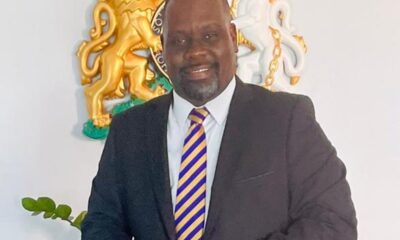
 News6 days ago
News6 days ago
 News12 hours ago
News12 hours ago














